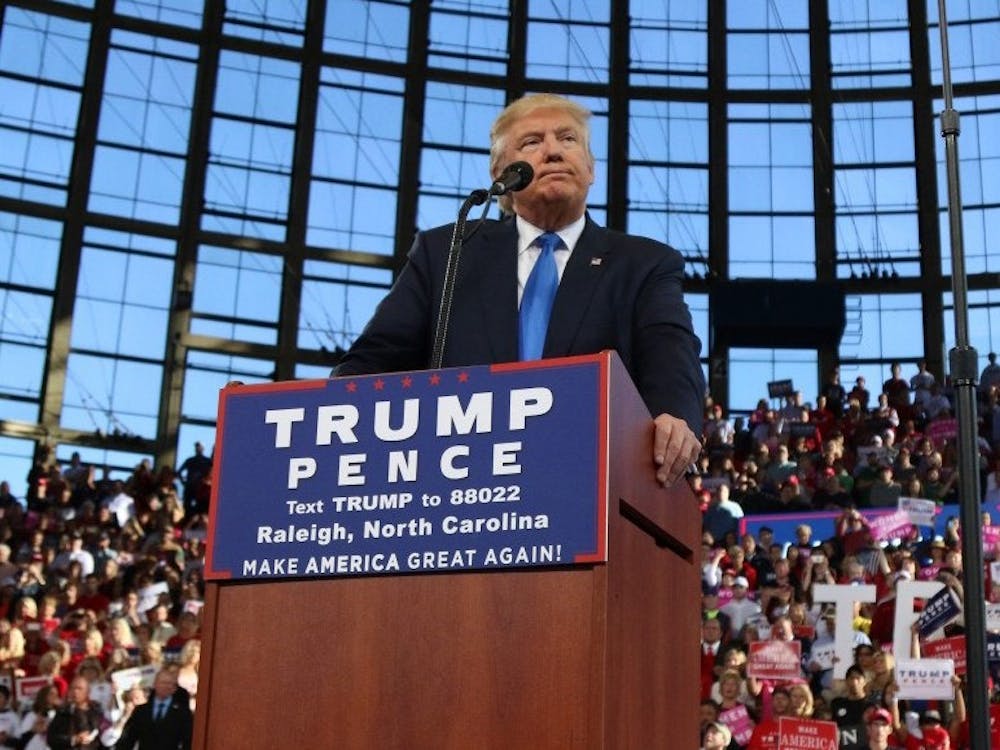As the Senate impeachment trial began last week, some professors at the Sanford School of Public Policy aired their views on the historic event.
After former President Donald Trump was accused of inciting the Jan. 6 Capitol insurrection that left five people dead, the House of Representatives drafted and introduced an article of impeachment against Trump Jan. 11. The article was premised on the “incitement of insurrection” against the government and “lawless action at the Capitol.”
With the impending impeachment proceedings, Speaker of the House Nancy Pelosi then issued an ultimatum to former Vice President Mike Pence: either invoke the 25th amendment to remove Trump’s powers within 24 hours, or the House would initiate impeachment proceedings.
After Pence refused, a House majority—including ten Republicans—voted to impeach Trump. This was the second time Trump had been impeached in 13 months, making him he first president to undergo two impeachments.
The majority of the Senate voted to proceed with the trial Feb. 9. On Feb. 13, the Senate acquitted Trump, with fewer than two-thirds of senators voting to convict. Seven Republicans crossed party lines to vote that Trump was “guilty” of inciting the Capitol riot.
Pope "Mac" McCorkle, professor of the practice in the Sanford School of Public Policy, said on Feb. 10 that the impeachment effort might not be successful because Trump’s act was an “eleventh-hour act.”
“It’s limited, obviously, by the partisan deadline and by the polarization that we’re in, so that it does not look like the effort is going to be successful,” McCorkle said. “If it were successful, it could disqualify former President Trump from holding office and running for president. So, that is of major significance. Te eleventh-hour nature of it is awkward, but the problem is that it was an eleventh-hour act on his part.”
McCorkle and Asher Hildebrand, associate professor of the practice at Sanford, both highlighted the differences between Trump’s first and second impeachment.
While Trump’s first impeachment proceedings, held Dec. 2019, involved two articles—alleging the abuse of power and obstruction of justice with respect to the Ukraine investigation—his second trial offered more tangible evidence.
“I think there are some pretty substantive differences between the two [impeachment trials]. The first impeachment proceeding, while the evidence was presented credibly and compellingly, was kind of an abstract idea for many senators,” Hildebrand said. “This time around, it’s much more concrete, visceral, and recent in their memories.”
The unprecedented circumstances of the trial prompted a Senate vote on whether Congress has jurisdiction to try a former president. On the first day of the trial, by a vote of 56 to 44—50 Democrats and six Republicans—the Senate voted in favor of the constitutionality of the trial.
Although the Constitution does not explicitly discuss the issue, House managers made the case that the founding document leaves the subject to the discretion of Congress.
Hildebrand said that although he is not a legal scholar and is not necessarily speaking to the constitutional arguments, “Congress had constitutional authority over impeachment, and certainly ruled [Feb. 9] in a bipartisan vote that they could go ahead and bring it.”
McCorkle said he thought some Republican leaders were privately angling to convict the former president in order to disqualify him from running for future office, which would ultimately boost their chances in the 2024 election.
“I think there’s a desire among a lot of Republicans, privately for conviction, and then taking the discretionary step of barring him from office. You’ll probably see Romney, Collins, Sasse, and more incremental Republican support for convicting in the Senate,” he said.
The seven senators who voted to convict Trump were Richard Burr (R-N.C.), Bill Cassidy (R-La.), Susan Collins (R-Maine), Lisa Murkowsk (R-Alaska), Mitt Romney (R-Utah), Ben Sasse (R-Nev.) and Pat Toomey (R-Pa.).
Following the Senate’s acquittal of Trump, McCorkel wrote in an email that it was “as minimal a victory for Trump as he needed and not much more.”
“I was surprised at how many Republicans voted for conviction—that we actually got to 57,” he wrote. “I do think some real damage was done to the Trump brand, but not so much with the base; I think the larger problem is... he’s still in control of the Republican party.”
McCorkle added that the acquittal would have potential negative future implications––namely, the “January exception,” in which future presidents would not be held accountable for impeachable offenses committed within their last days in office.
Get The Chronicle straight to your inbox
Sign up for our weekly newsletter. Cancel at any time.
Halle Friedman is a Trinity senior and an associate news editor of The Chronicle's 119th volume.

